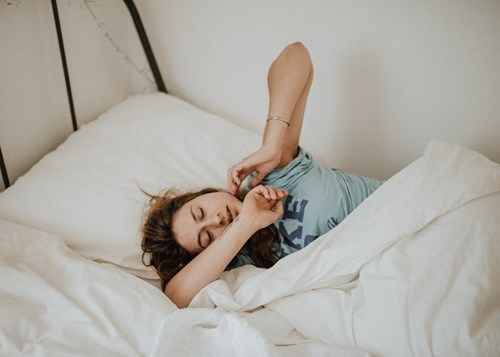Why Do We Get Sleep In Our Eyes?
22 January 2020

We’re sure you are familiar with the term ‘eye boogers’. Believe it or not, that horrible gloopy stuff you get in the corner of your eyes has an official name. Eye boogers are more eloquently known in the industry as rheum.
It’s also referred to as sleep, because more accumulates overnight. Sleep is a mixture of mucus, oil, skin cells and other debris that collect in the corners of the eyes during the night.
This harmless substance is a sign of healthy eyes because it is essentially produced as a natural defence mechanism. Our clever eyes work hard every night to fight unwanted germs as we sleep!
If you’ve ever found yourself wondering what causes sleep or if there’s anything you can do to minimise it, please read on.
What causes sleep in the eyes?
As mentioned above, the substance that builds up in the corner of the eyes is protective. Its main responsibility is to remove harmful debris from the tear film (surface of the eye).
However, it’s not only doing its job as we sleep. ‘Eye boogers’ are produced all day long but are washed away when we blink. It’s more evident in the mornings, because we don’t blink whilst we are asleep.
There are several reasons why someone may experience more sleep than ‘usual’. The immune system kicks in to produce extra ‘gloop’ when it feels threatened by an irritant- this is its natural method of getting rid of it.
Common causes of ‘excess’ sleep include:

Weather changes
Both allergy season and cold weather can accelerate the rate at which eye discharge is produced. Cold winds and indoor heating contribute significantly to the over-production of sleep.
This is all down to the harsh elements causing the eyes to lose natural moisture and dry out.
Dry Eye Syndrome
Dry Eye Syndrome is a common condition that occurs when the eyes are not sufficiently lubricated and affects roughly one in every three people, over the age of 65.
When the eyes do not produce enough good quality tears, they over compensate by producing large amounts of mucus (sleep). In these cases, sleep usually appears very watery.
Dry eyes can be very uncomfortable; luckily over-the-counter eye drops are usually sufficient enough to address the problem. These can be bought from high-street retailers such as Asda or Boots Opticians.
Eye products
Make-up, toiletries or contact lens use, all interfere with the eyes natural flow of moisture. We hear concerns from contact lens wearers especially, regarding problems with excessive eye mucus.
This is because contact lenses limit oxygen flow to the eyes. Without a steady flow of oxygen, eyes struggle to produce natural tears and as a result work on overdrive- very similar to dry eye syndrome.
If you experience an increase in sleep after wearing contact lenses, speak to your optometrist who can check your eyes to rule out infection.
Conjunctivitis
Sleep or general eye discharge is a common symptom of conjunctivitis; an eye condition caused by inflammation of the thin clear layer of tissue covering the surface of the eye (the conjunctiva).
The eye discharge in this instance will usually be accompanied by itchy, irritated and red eyes- very unpleasant! The good news is that conjunctivitis usually gets better within a week or two without treatment.
If it does persist, please speak to an optometrist who will examine your eyes for more serious problems.
When to see an optometrist
A small amount of eye mucus is normal; especially after a good night’s sleep. If it accompanies additional symptoms or sudden changes however, we advise that you book yourself in to see an optometrist.
This is to check for more serious eye conditions or infections.
Additional warning signs to look out for are:
- Green or yellow eye discharge
- Blurry vision
- Sensitivity to light
- Red or sore eyes
- Pain in one or both eyes
Serious eye infections that cause abnormal eye discharge can be:
- Eye herpes
- Fungal keratitis (a rare but serious inflammation of the cornea)
- Acanthamoeba keratitis (a dangerous infection typically caused by poor contact lens hygiene or swimming in contacts)
How can I stop my eyes producing so much sleep?
Eye mucus indicates healthy eyes. Although it can feel and look slightly unpleasant, it’s important for the eyes to ward off potential dangers.
If you are sure that there is no serious cause for concern with the health of your eyes, but you want to reduce the amount of sleep they produce, there are a few simple tricks you can try.
Firstly, make sure you fully remove any eye make before bed. We know it’s tempting to skip this when it’s late and you’re tired, but try to make a habit of it. After your eyes are free from make-up, use a warm flannel to gently soak the area; keeping your eyes closed as you do this.
If you suffer with dry eye syndrome, try over-the-counter eye drops to keep your eyes nice and moist throughout the day. If this fails, there is a non-invasive treatment available called MiBo Thermoflo. This procedure only lasts around 12 minutes per eye and offers immediate relief.
Additionally, eating a diet rich in omega-3 can help. This means trying to include more salmon, eggs, spinach, oatmeal and yogurt into your recipes.
Always consult an optometrist if you notice any changes to your eye health or vision.
Back to Blog
